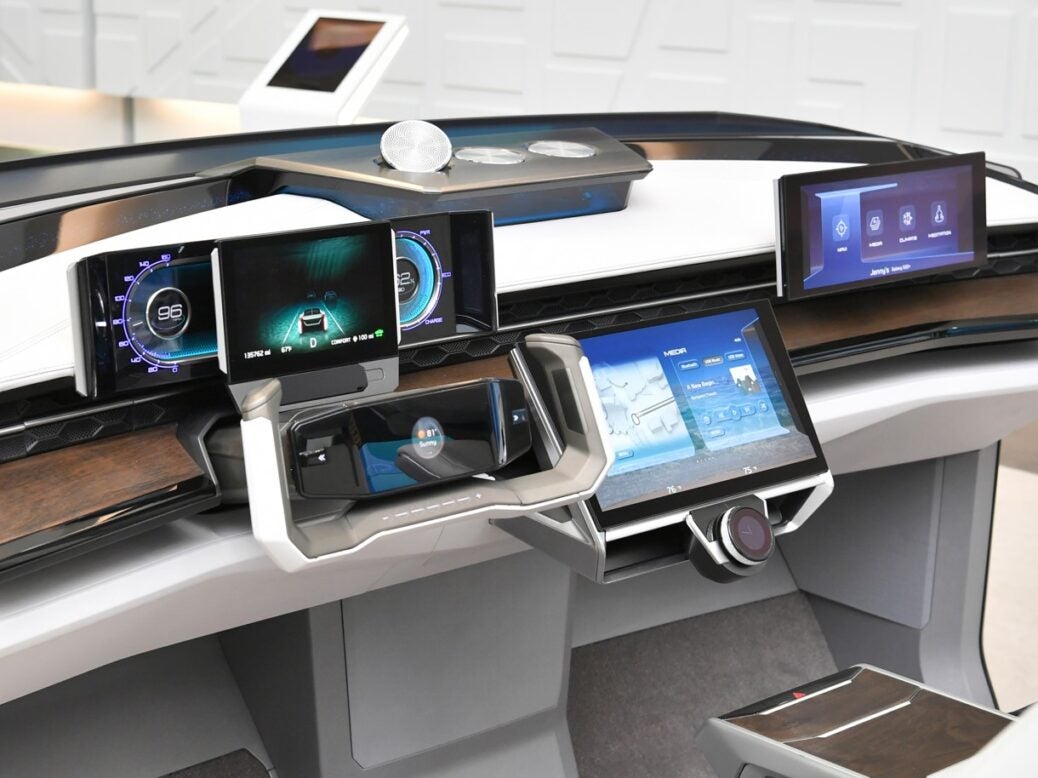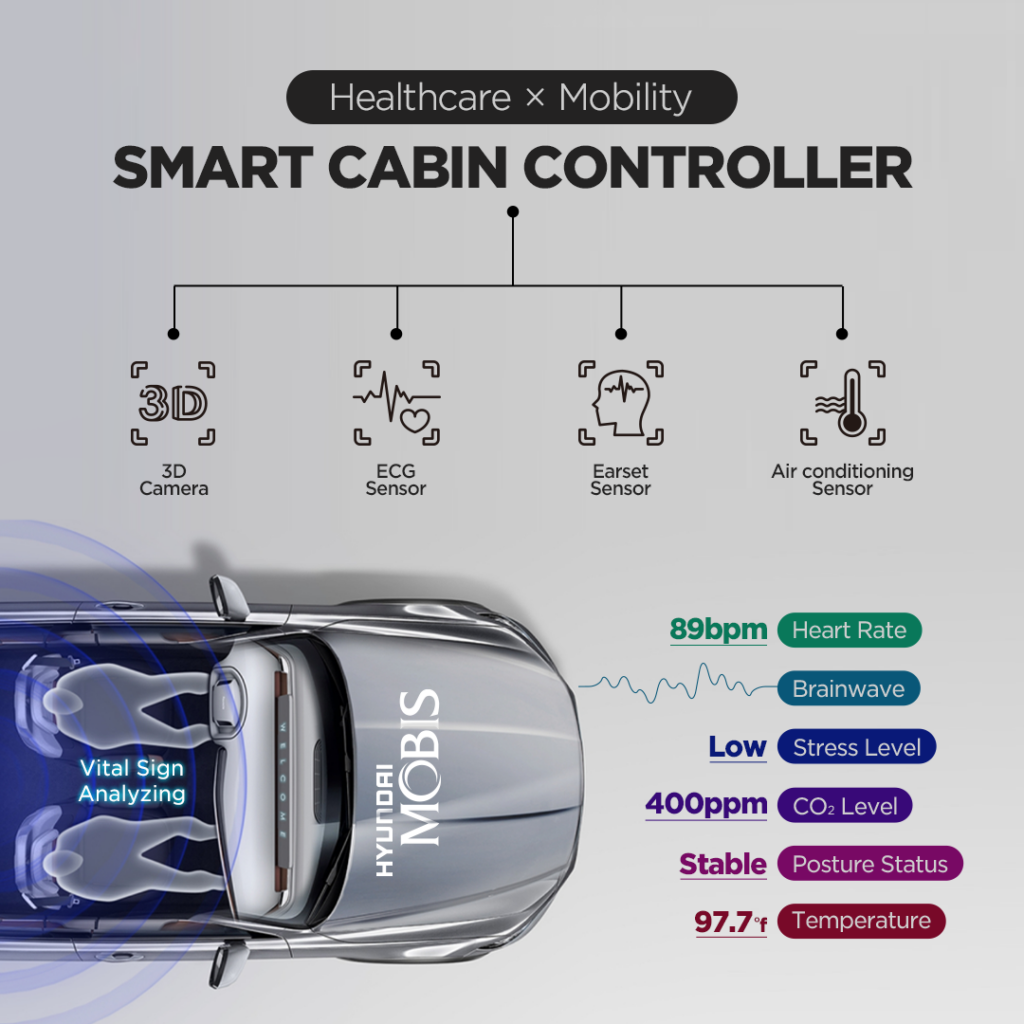
Hyundai Mobis has recently developed technology which monitors a driver’s heart rate and brain waves to ensure safe driving is maintained at all times
The issue of drunk driving and road accidents caused by other health factors such as fatigue and reduced concentration is a global phenomenon. Based on the 1.25 million annual road fatalities worldwide, alcohol-related deaths among fatally injured road users are around 273,000 people every year.
With statistics like this in mind, Hyundai Mobis has unveiled new technology which monitors vital signs of a driver’s health. The new Smart Cabin Controller technology analyses posture, brain waves and heart rate to monitor the driver’s condition and cognitive state.
If the technology detects any serious issues or has ‘concerns’ about the driver, it can switch the vehicle to autonomous driving mode to maintain safety, drive to a hospital and much more. The company have stated that in the future the technology may be able to prevent drunk driving.
We spoke to Chang Won Lee, principal research engineer, creative UX Cell, advanced engineering Sector at Hyundai Mobis, to find out more about this technology and the benefits it will bring to the industry.

Just Auto (JA): Could you tell me a little bit about your role and what that involves?
Chang Won Lee (CWL): I’m leading the project to develop human centred technology that can be applied to the vehicle, which includes sensing, signal processing, detecting, and classifying biological signals.
Biological signals include local and time information of biological activity, such as heartbeat, movement, and thinking. They can be acquired electrically, chemically, and mechanically.
The most recent project I have been leading is M.Brain, the world’s first bio-health technology to monitor human brain signals with electroencephalography (EEG) for safe and interactive driving.
M.Brain is a vehicle safety control system that detects driver weariness, sleepiness, inattention, and health to send visual, tactile, and audio alerts in order to help reduce accidents.
In addition, I am participating in the project of the smart cabin controller technology. My role is to utilise the biological signals in the smart cabin controller to provide a better understanding of drivers and passengers.
Could you explain how this new smart cabin controller technology works and what its aims are?
Hyundai Mobis’ smart cabin controller includes a sensor to measure the driver’s bio signals, a controller to analyse these signals, and software logic.
There are four sensors in total, namely a 3D camera that captures a three-dimensional image of the driver’s position, an electrocardiogram sensor on the steering wheel, an ear set sensor that measures brain waves emitted from the ears, and an HVAC sensor that measures the temperature, humidity, and the carbon dioxide levels inside the cabin.
The biosignals collected by these four sensors are then sent to the controller. The controller, upon analysing the bio-signals in real time, alerts the driver via the navigation, the control panel, or the head-up display (HUD) if it deems the driver is at risk of drowsy driving or other health associated risks.
If the data collected by the electrocardiogram sensor suggests a chance of high stress, the controller recommends autonomous driving. If the carbon dioxide level inside the vehicle is high, the controller automatically opens the windows or changes the mode of HVAC to enable outside air intake.
The smart cabin controller has great potential for growth because it is, in a way, a highly intellectual brain that provides analysis on biological signals even when they change in real time. For example, it can be developed so that it will instantly stop someone from driving while drunk or automatically drive the passenger to an emergency room in situations like a cardiac arrest.
What are the benefits that this technology will bring to the automotive industry?
Most technologies that have been applied to vehicles up until now are dependent on the control of the driver (steering, switches, etc). However, the essence of the technology that we are looking to develop is being able to provide services or technical assistance by automatically identifying these situations, much like personalised recommendations on your smartphone.
This technology, which offers a more in-depth comprehension of the driver on the basis of his or her biosignals, can lead to more intuitive, seamless features and services, just like how unlocking your smartphone using biometrics like your fingerprints are a better alternative than manually entering your password.
The smart cabin controller developed by Hyundai Mobis is an example of driver centric, rather than performance centric safety technology.
It is surely a critical component of mobility of the future when autonomous driving will become the norm. When that time comes, the technologies that drive innovation will need to be those that are designed around the driver, and not around improving performance of the vehicle.
What sets this technology apart from others on the market?
Not only are most healthcare related technologies developed for the IT market, but most of them are also still in their research phase and have rarely been applied to actual vehicle environments. Therefore, we gave a lot of thought into real life applications from as early as sensing and technical application stages.
How can customers get involved with this technology?
The smart cabin controller comes with technologies to tend to the health of the driver. For example, if the electrocardiogram sensor determines that the driver is under high stress, the colour of the lighting inside the vehicle changes to green and the car’s aroma diffuser is automatically turned on to calm the driver.
There are also features to help with motion sickness for passengers. The LED lights located at the sides of the seats help passengers know in advance the direction and speed of the vehicle. This feature is designed based on the fact that motion sickness occurs when passengers cannot predict the vehicle’s direction and speed.
How much better would it be if your car could even take care of your health? Technologies that monitor the health of the driver is a must have for safe autonomous driving. If the vehicle can identify risks of emergencies, such as when the driver or a passenger loses his or her consciousness, the car could autonomously drive the person to an emergency room, let alone call the emergency room or a rescue team.
What do you think the future holds for this technology?
What will the inside of a car look like in the future when autonomous driving becomes the norm?
Hyundai Mobis anticipates the future mobility to take on the role as a moving ‘health examination centre.’ This is exactly why the company continues to acquire expert human resources and pursue research on bio-engineering and robotics. The smart cabin controller is the outcome of these arduous endeavours.
This technology can be applied to the current mobility but also future mobility including urban air mobility, pharmacy benefits managers, personal mobility, and robots. I believe the human-centred technology just like smart cabin technology will become essential for future mobility.
